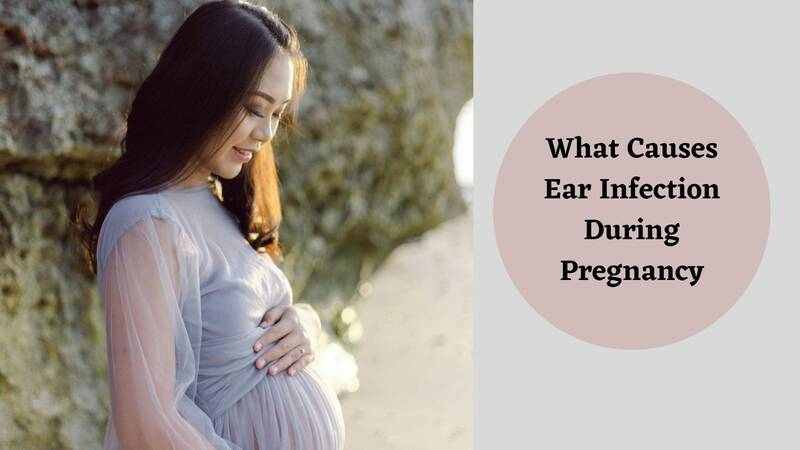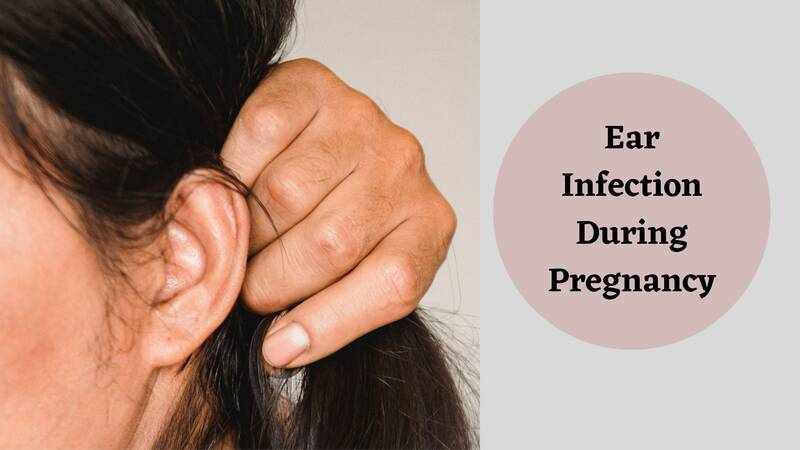With pregnancy comes the expected lot of amazing transformations to your body, but a few of them can come as a surprise.
An ear infection during pregnancy is probably one of all the things.
Today, here in our post, we have outlined the probable causes, symptoms, and treatment for ear infections!
There are several reasons behind the occurrence of ear infections during pregnancy.
They are treated easily and are quite harmless.
But, always make sure to visit your doctor if you have any type of infection while pregnant.
Ear infections are extremely harmful to your health and your baby’s growth, and in the rarest instances, it leads to severe complications.
Contents
What Causes Ear Infection During Pregnancy?

Generally, infections are common when you get pregnant.
The nose, ear, and throat transform during pregnancy leading to the increased risk of ears getting infected.
Viral or bacterial infections cause ear infections.
The likely changes that happen during pregnancy are:
Higher basal metabolic rate (BMR)
Your body will need a massive amount of oxygen levels and greater blood volume during your pregnancy.
Your heart will work harder to move the fluid around.
Your ear may start to ache though it may not appear like an infection if there is a buildup of fluid in your ear.
Hormonal changes
The levels of progesterone and estrogen rise up during pregnancy.
These are the hormones that affect your immune system making you prone to illnesses from viruses and bacteria.
However, the proper connection between infections and hormones is not completely clear.
More fluid
You will retain more fluid in your body due to the increased blood flow.
This leads to several other adverse effects.
For instance, you may see that you have a clogged nose during pregnancy.
Ear infections increase with more fluid accumulation in the sinuses and the nose during pregnancy.
Pregnancy comes with transformations causing other temporary issues with the ear like dizziness or vertigo.
Your balance and hearing get affected during pregnancy if you have an existing condition such as Meniere’s disease.
You have a greater chance of getting ear and different types of infections if it is cold, flu, or allergy season.
Inner ear damage or infection can often lead to:
- vertigo
- hearing loss
- tinnitus
What are the Symptoms of ear infection during pregnancy?
The following are the common symptoms of ear infections:
- sharp, dull, or burning pain, mainly when you are pressing on the external ear
- redness, swelling, or inflammation of the ear canal
- itching around and in your ear
- hearing loss
- loss of hearing
- ringing in-ear or tinnitus
- headache
- green or yellow leakage from the ear.
Read– Maracuja Oil Benefits
Home remedies to treat ear infections

You can easily treat ear infections without a professional intervention by using the easy remedies that you can find in your home.
Below is a list of a few easy remedies that can effectively treat the symptoms of an ear infection and relieve earache.
Take Medically-Approved Pain Relievers
It is essential to pay closer attention to the medications that you take if you have contracted a viral ear infection or have pain in your ear during pregnancy.
Some drugs can hurt the health of your baby.
Tylenol or acetaminophen is the only OTC pain reliever considered safe throughout the whole gestational period of 40 weeks.
The research has shown that the rapid exposure to aspirin or NSAIDs during the initial trimesters of pregnancy is associated with the risks of aspirin, cardiac malformation, and naproxen.
The common side effect of consuming these pain pills is the deformed development of your child, leading to damaging birth defects.
Warning– Always speak to your healthcare provider about the dosage you need to take before subjecting yourself to any type of medication.
Consider a Decongestant or An Antihistamine
Several times, ear pain arrives mainly due to allergies.
Pressure or discomfort is caused when congestion happens in your nasal passages and sinuses.
You can gain instant relief when you take antihistamines and decongestants created to dry up liquid buildup within your body.
Apply Warm Compress
The importance of circulation in the healing process cannot be overstated.
The physiological effects of this heat treatment will include:
- Alleviation of pain.
- Increasing the flow of blood.
- The flexibility of the connective tissues as well as metabolism.
As a result, a warm compress is a simple approach to dilate your blood vessels and speed up the delivery of white blood cells, which help fight infections.
While heat is a great way to promote healing, you must be careful not to burn yourself.
When addressing ear infections during pregnancy, make sure the heating element is on low heat and wrap your compression bandage in a towel before putting it to your ear.
Rub Alcohol & White Vinegar
One of the most effective home remedies is by creating a blend of rubbing alcohol as well as distilled white vinegar at about a one-to-one ratio if you locate yourself with a case of swimmer’s ear while you are undergoing pregnancy.
These are do-it-yourself ear drops helping you dry out the exterior ear canal and kill any type of bacteria as vinegar is rich in natural antibacterial effects.
Hydrogen Peroxide
For those that have a blockage due to ear wax buildup, on the other hand, use a dropper to add a bit of hydrogen peroxide to their ear.
When using this procedure, flip your head horizontally, spread the antiseptic, and wait ten seconds before immediately flipping your head back over.
The earwax might soften and break down, allowing the blockage to be removed.
Another simple cure is hydrogen peroxide, which is included in many over-the-counter ear drops.
Antibiotic Ear Drops
Lastly, your physician can prescribe the antibiotic ear drops when there is a bacterial infection.
Keep in mind to inform your physician about your being pregnant.
The otolaryngologist may not understand your condition while your OCGYN understands the situation you are in.
Adjust Your Sleep Position
The easy way to reduce the pain in your ear is to avoid sleeping with the affected ear against your pillow.
It will allow the fluids to drain effectively, preventing you from applying more pressure on this area.
Try the Nightguard
If you are suffering from TMJ or Temporomandibular Joint disorders, then the pain in your ear can be the pain occurring from teeth grinding.
Speak to your dentist and get a night guard to help reduce the discomfort on your jaw if you are undergoing any type of discomfort in your ears and temples.
Make sure that you are with your Nightguard while you sleep if you have one already.
Chew Gum
Changes in air pressure can also cause earaches; that is why popping a bubble of bubble gum into your ear is one of the quickest ways to relieve the discomfort and pressure.
The eustachian ducts in your ears are opened by locking and unlocking your jaw, eliminating the pressure differential between the opposite wings of your eardrum.
Stay Hydrated and get sufficient rest
Lastly, like any other illness, hydration and rest are the main aspects of the recovery process.
These are quite important daily necessary steps to take, especially when you are pregnant.
Your body is transforming, and according to research, it is seen that during pregnancy, there is a greater demand for similar kind of energy levels as long as there is an athletic endurance event,
Things to prohibit from
It is critical not to try to manually clear out material that may be causing a blockage if you have earaches or ear infections during pregnancy.
This may push earwax deeper into the ear or, even worse, puncture the eardrum.
Furthermore, avoid getting your ear canal moist in any manner.
Bacteria can proliferate as a result of this. After showering, gently shake your head from side to side to help drain any extra water.
Furthermore, if you’ve been prescribed antibiotic solutions for a medical ear infection, don’t stop taking them just because your symptoms have subsided
. Follow your doctor’s instructions and finish the prescription.
Read– Heel Pain in the Morning
When should you speak to your caregiver?
For prenatal care, see a doctor regularly. If you suspect you have an ear infection, call your doctor right away.
Although not all earaches are infections, it’s always a good idea to get them checked.
An infection has the potential to spread and harm your hearing.
Tell your doctor (ringing in your ears) if you experience any other ear issues, such as tinnitus; tell your doctor (ringing in your ears).
Other significant health issues, such as high cholesterol or iron deficiency anemia, can produce tinnitus and other ear symptoms.
In some situations, your doctor may recommend you to an otolaryngologist, sometimes known as an ENT specialist, who specializes in ear, nose, and throat diseases.
Medically acclaimed treatment for ear infection during pregnancy
Before taking any over-the-counter pain relievers, consult your doctor.
While acetaminophen is generally safe during pregnancy, aspirin and ibuprofen anti-inflammatory medicines (NSAIDs) such as ibuprofen (Advil) or naproxen should be avoided (Aleve).
Antibiotics are commonly used as a treatment for severe infections and ear infections.
Many antibiotics, however, it is not recommended to take during pregnancy. Your doctor will be able to choose the best solution for you.
Your doctor will check for inflammation inside your ear canal.
They might take a sample of fluid to test.
If you suffer from a significant bacterial ear infection, your physician can suggest antibiotic ear drops that are to be used for a couple of weeks.
Ear washes and ointments are two more therapies that may be safe to use during pregnancy.
Read– What is a Hairline Fracture?
How harmful is an ear infection to your baby?
Any type of infection is hazardous to you and your baby.
When you leave it untreated, a severe ear infection spreads throughout your brain and other body regions.
Your physician should recommend consuming an antibiotic that is safe during pregnancy if your ear infection is severe.
FAQs
Below we share some FAQs related to the query “Ear Infection During Pregnancy”
1. Is there anything that works to treat my ear infection when I’m pregnant?
While acetaminophen is generally safe during pregnancy, aspirin and nonsteroidal anti-inflammatory medicines (NSAIDs) such as ibuprofen (Advil) or naproxen should be avoided. Antibiotics are designed to treat serious bacterial ear infections.
2. How prevalent are ear infections during pregnancy?
Pregnant women are more likely to get ear infections than non-pregnant women.
Earaches are more likely to occur in pregnant women who are already vulnerable to them.
3. Is it safe to use Earache Drops when pregnant?
If there is no sign of a tympanic membrane perforation, standard therapies, such as polymyxin B-neomycin-hydrocortisone otic suspension, are beneficial to health.
4. Till when do ear infections last?
Several ear infections will get cleared in about three days, although at times, the symptoms can last for a week.
5. Will an ear infection subside on its own?
Ear infections are not common in adults and kids, but they will happen irrespective of anything.
Ear infections often ward off on their own and may not be medically treated.
6. When I’m pregnant, why would my ears feel clogged?
Ears can become blocked for a variety of reasons during pregnancy.
The tube that feeds the nose to the ears (eustachian tube) can easily get obstructed as a result of pregnancy changes that include swelling of the nasal lining.
Simple treatments like depressants or nasal sprays medically prescribed may be beneficial.
7. How do you get a good night’s sleep if you have an ear infection?
Place about two cushions under your head so that your affected ear is greater than the corresponding of your body.
Ear discomfort is minimized when there is less pressure in the ear. It might work, albeit a few inches might not make much of a difference.
8. How can I know if I have an ear infection?
If your conditions are not favorable within three days, you should consult your doctor right away.
If your body temperature elevates above 100.4 degrees and you are suffering from a fever, it could be a sign of severe infection.
Ear infections are common, and they can progress to hearing loss if left untreated.
9. What transpires if you don’t treat an ear infection?
If left untreated, bacteria can affect other tissues around the ear and even into the skull in rare circumstances, causing meningitis.
Infections are more likely to travel to the mastoid bone, located right at the backside of the ear, where they can lead to damaged bone and cysts filled with pus.
10. How to get rid of an ear infection?
Antibiotics are powerful antibiotics that kill germs. Doctors frequently give oral antibiotics in pill or liquid form for ear infections.
On the other hand, Eardrops are sometimes safer and more effective than oral medications.
Read– Stone Bruise
Key Takeaway
- There are several transformations in your body when you are pregnant.
- It increases the risk of some types of infections, such as ear infections during pregnancy.
- In several cases, ear infections happening when you are pregnant are subtle.
- It is essential to discuss with your doctor if you are undergoing some type of ear symptoms.
- In worst cases, ear infections cause longer-lasting damage affecting your hearing senses when it is not treated.
- Not all antibiotics and pain medications are safe during your pregnancy. Your physicians will be prescribing the safe treatment.
Read– Are Beets Good For Diabetes
- Understanding HIPAA Compliance: Obligations for Covered Entities and Business Associates - April 23, 2024
- Things to Invest in for the Easter Season in 2024 - March 29, 2024
- Why Experience Matters: Finding An Established Dental Implants Provider - March 29, 2024
